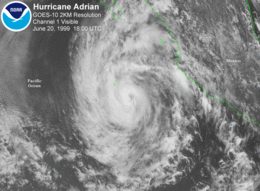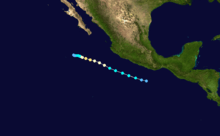Hurricane Adrian (1999)
| Category 2 hurricane (SSHWS/NWS) | |
 Hurricane Adrian on June 20, 1999 | |
| Formed | June 18, 1999 |
|---|---|
| Dissipated | June 22, 1999 |
| Highest winds |
1-minute sustained: 100 mph (155 km/h) |
| Lowest pressure | 973 mbar (hPa); 28.73 inHg |
| Fatalities | 6 |
| Areas affected | Mexico |
| Part of the 1999 Pacific hurricane season | |
Hurricane Adrian was a tropical cyclone that caused widespread flash flooding while remaining offshore of Mexico. The first named storm and first hurricane of the season, Adrian developed on June 18, 1999 from a large area of disturbed weather to the southwest of the Mexican coastline. Later that day, Adrian strengthened into a tropical storm. Gradual strengthening followed, as Adrian had intensified into a hurricane early on June 20. Further strengthening occurred, and Hurricane Adrian peaked as a 100 mph (155 km/h) category 2 hurricane, later that same day. Maintaining this intensity for approximately 12 hours, Adrian rapidly weakened thereafter on June 21 while simultaneously slowing in forward movement. Strong wind shear and cooling water temperatures caused Adrian to weaken to a tropical storm late on June 21. Weakening of Tropical Storm Adrian continued, and on June 22, it had been downgraded to a tropical depression. Later on that same day, the National Hurricane Center declared that Tropical Depression Adrian had dissipated. Large waves and inland flash flooding from Hurricane Adrian resulted in six fatalities, with an unknown amount of damage.
Meteorological history

A large area of disturbed weather meandered to the south of the Gulf of Tehuantepec for several days. Quickly showing signs of organization, a low-level circulation and banding features were visible on satellite imagery by June 16. Simultaneously, a tropical wave emerged from Africa on June 5 and crossed the Atlantic; it later moving in the vicinity of the developing cyclone. The tropical wave had merged with the developing cyclone, which resulted in enhanced convection.[1]
It is estimated that Tropical Depression One-E formed on June 18 while centered approximately 225 miles (362 km) southwest of Acapulco, Guerrero in Mexico.[2] Heading mainly west-northwest for much of its duration, and would also parallel the coast of Mexico while a tropical depression between 175-225 mi (282–362 km) offshore. Its forward direction to the west-northwest was due to an influence by a deep-layered ridge of high pressure over Mexico. Later on June 18, Tropical Depression One-E began to accelerate while strengthening into Tropical Storm Adrian.[3] Thereafter being upgraded to a tropical storm, Adrian was upgraded to a hurricane on June 20 while centered 420 mi (676 km) south-southeast of the southern tip of Baja California.[4] Further strengthening of Hurricane Adrian occurred that same day, and Adrian had become a category 2 hurricane. Simultaneously to becoming a category 2 hurricane, Hurricane Adrian attained its peak intensity with winds of 100 mph (155 km/h) and a minimum pressure of 973 mbar (hPa; 28.73 inHg).[1]
After reaching peak intensity on June 20 and maintaining this intensity for approximately twelve hours, Hurricane Adrian began a rapidly weakening trend while moving further from the Mexican coast. Rapid weakening had been attributed to cooling sea surface temperatures and higher wind shear. Passing only 40 mi (64 km) south of Isla Socorro, Adrian weakened to a category 1 hurricane.[1] Later on June 21, Adrian had weakened further, and was downgraded to a tropical storm while decelerating.[5] After several hours as a tropical storm, Adrian weakened to a tropical depression.[6] Six hours after the downgrade to a tropical depression, Tropical Depression Adrian was declared to have dissipated while centered 300 mi (483 km) southwest of the southern tip of Baja California.[1]
Impact

Hurricane Adrian dropped rain across most of Mexico, which resulted in flash flooding. The rainfall spread long distances, with associated rainfall stretching from Baja California to the Yucatan Peninsula, and as far north as the Mexico/Texas border. Across much of Mexico, rainfall amounts were at three in (76 mm) or less, although there were isolated areas with rainfall greater than seven in (178 mm). Rainfall in Mexico had peaked at 15.75 in (400 mm) in Coyutla, Veracruz.[7] While formation on June 18, the cyclone produced winds at least at 35 mph (55 mm) throughout much of the day. Reuters had also reported large waves near the coastline of Mexico while Hurricane Adrian was passing offshore. Outside of Mexico the only other affected region was Socorro Island, with reported winds at 45 mph (72 km/h) during Adrian's closest approach.[1]
Throughout its duration, Hurricane Adrian caused six fatalities, with four perishing from rough seas and two directly from the floods. In addition to the six fatalities, one person was also listed as missing in the flooding areas. There is no known damage amounts from the associated flashing flooding.[1]
See also
References
- 1 2 3 4 5 6 Lawrence, Miles (July 17, 1999). "Hurricane Adrian Preliminary Report". National Hurricane Center. Retrieved 16 July 2010.
- ↑ Beven, Jack (June 18, 1999). "Tropical Depression One-E Discussion Number 1". National Hurricane Center. Retrieved 16 July 2010.
- ↑ Franklin, James; Pasch, Richard (June 18, 1999). "Tropical Storm Adrian Discussion Number 3". National Hurricane Center. Retrieved 17 July 2010.
- ↑ Avila, Lixion (June 19, 1999). "Hurricane Adrian Discussion Number 8". National Hurricane Center. Retrieved 17 July 2010.
- ↑ Beven, Jack; Lawrence, Miles (June 21, 1999). "Tropical Storm Adrian Discussion Number 15". National Hurricane Center. Retrieved 18 July 2010.
- ↑ Avila, Lixion (June 22, 1999). "Tropical Depression Adrian Discussion Number 17". National Hurricane Center. Retrieved 18 July 2010.
- ↑ Roth, David (2006). "Hurricane Adrian - June 16-23, 1999". National Oceanic and Atmospheric Administration. Retrieved 18 July 2010.
External links
| Wikimedia Commons has media related to Hurricane Adrian (1999). |
